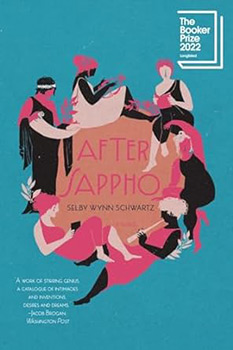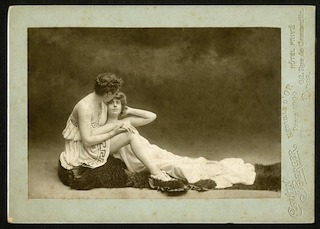Summary | Excerpt | Reviews | Beyond the book | Read-Alikes | Genres & Themes | Author Bio

A Novel
by Selby Wynn SchwartzAn exhilarating debut from a radiant new voice, After Sappho reimagines the intertwined lives of feminists at the turn of the twentieth century.
"The first thing we did was change our names. We were going to be Sappho," so begins this intrepid debut novel, centuries after the Greek poet penned her lyric verse. Ignited by the same muse, a myriad of women break from their small, predetermined lives for seemingly disparate paths: in 1892, Rina Faccio trades her needlepoint for a pen; in 1902, Romaine Brooks sails for Capri with nothing but her clotted paintbrushes; and in 1923, Virginia Woolf writes: "I want to make life fuller and fuller." Writing in cascading vignettes, Selby Wynn Schwartz spins an invigorating tale of women whose narratives converge and splinter as they forge queer identities and claim the right to their own lives. A luminous meditation on creativity, education, and identity, After Sappho announces a writer as ingenious as the trailblazers of our past.
For the women in Schwartz's debut novel, Sappho is the flame that kindles their creativity, the beacon that guides them, igniting their love and passion, turning their eyes toward the sea, and lighting the way into new, uncharted waters. The "we" used by the chorus of narrators becomes the "we" of all women who break new ground, transgress societal boundaries, love other women, and emulate Sappho by leaving lasting artistic legacies of their own...continued
Full Review
 (640 words)
(640 words)
(Reviewed by Jo-Anne Blanco).
 Selby Wynn Schwartz's debut novel After Sappho reimagines the lives of early 20th century lesbian authors and artists. The novel tells the story of how these women ignited a radical feminist movement inspired by the ancient Greek poet Sappho, broke free from conventions to pursue their own desires and creativity, and flourished within their own women-only communities. In her 1907 work Comment les femmes deviennent écrivains (How Women Become Writers), the French writer Aurel, who ran her own literary salon from 1915 until her death in 1948, stated her belief that women should not follow the rules for writing that had been laid down by men. "It was time for women to take language for themselves, Aurel said, even one word at...
Selby Wynn Schwartz's debut novel After Sappho reimagines the lives of early 20th century lesbian authors and artists. The novel tells the story of how these women ignited a radical feminist movement inspired by the ancient Greek poet Sappho, broke free from conventions to pursue their own desires and creativity, and flourished within their own women-only communities. In her 1907 work Comment les femmes deviennent écrivains (How Women Become Writers), the French writer Aurel, who ran her own literary salon from 1915 until her death in 1948, stated her belief that women should not follow the rules for writing that had been laid down by men. "It was time for women to take language for themselves, Aurel said, even one word at...

If you liked After Sappho, try these:

by M.T. Anderson
Published 2025
From the award-winning and bestselling author of Feed comes a raucous and slyly funny adult fiction debut, about the quest to steal the mystical bones of a long-dead saint

by Allen Bratton
Published 2024
Crackling with intelligence and wit, Henry Henry is a brilliant recasting of the Henriad in which Hal Lancaster is a queer protagonist for a new era.